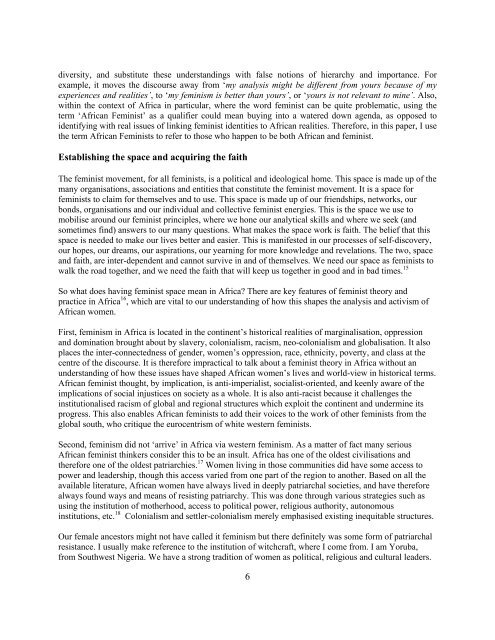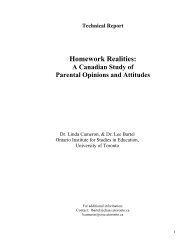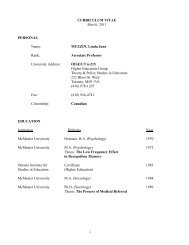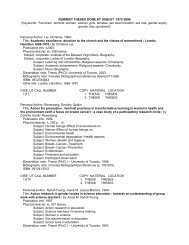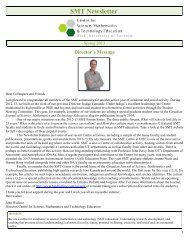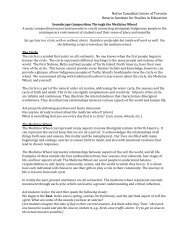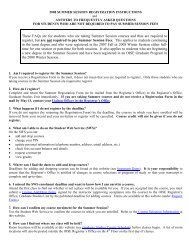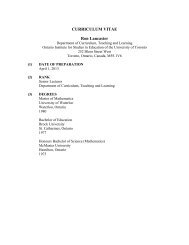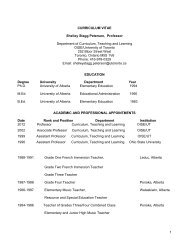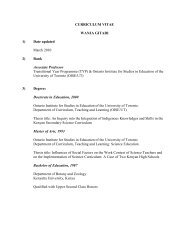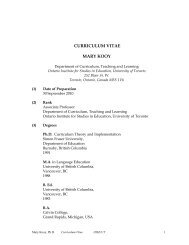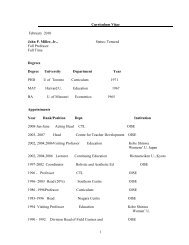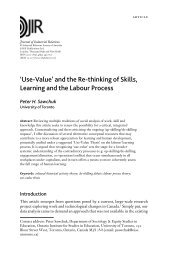CREATING AND SUSTAINING FEMINIST SPACE IN AFRICA ...
CREATING AND SUSTAINING FEMINIST SPACE IN AFRICA ...
CREATING AND SUSTAINING FEMINIST SPACE IN AFRICA ...
You also want an ePaper? Increase the reach of your titles
YUMPU automatically turns print PDFs into web optimized ePapers that Google loves.
diversity, and substitute these understandings with false notions of hierarchy and importance. For<br />
example, it moves the discourse away from ‘my analysis might be different from yours because of my<br />
experiences and realities’, to ‘my feminism is better than yours’, or ‘yours is not relevant to mine’. Also,<br />
within the context of Africa in particular, where the word feminist can be quite problematic, using the<br />
term ‘African Feminist’ as a qualifier could mean buying into a watered down agenda, as opposed to<br />
identifying with real issues of linking feminist identities to African realities. Therefore, in this paper, I use<br />
the term African Feminists to refer to those who happen to be both African and feminist.<br />
Establishing the space and acquiring the faith<br />
The feminist movement, for all feminists, is a political and ideological home. This space is made up of the<br />
many organisations, associations and entities that constitute the feminist movement. It is a space for<br />
feminists to claim for themselves and to use. This space is made up of our friendships, networks, our<br />
bonds, organisations and our individual and collective feminist energies. This is the space we use to<br />
mobilise around our feminist principles, where we hone our analytical skills and where we seek (and<br />
sometimes find) answers to our many questions. What makes the space work is faith. The belief that this<br />
space is needed to make our lives better and easier. This is manifested in our processes of self-discovery,<br />
our hopes, our dreams, our aspirations, our yearning for more knowledge and revelations. The two, space<br />
and faith, are inter-dependent and cannot survive in and of themselves. We need our space as feminists to<br />
walk the road together, and we need the faith that will keep us together in good and in bad times. 15<br />
So what does having feminist space mean in Africa There are key features of feminist theory and<br />
practice in Africa 16 , which are vital to our understanding of how this shapes the analysis and activism of<br />
African women.<br />
First, feminism in Africa is located in the continent’s historical realities of marginalisation, oppression<br />
and domination brought about by slavery, colonialism, racism, neo-colonialism and globalisation. It also<br />
places the inter-connectedness of gender, women’s oppression, race, ethnicity, poverty, and class at the<br />
centre of the discourse. It is therefore impractical to talk about a feminist theory in Africa without an<br />
understanding of how these issues have shaped African women’s lives and world-view in historical terms.<br />
African feminist thought, by implication, is anti-imperialist, socialist-oriented, and keenly aware of the<br />
implications of social injustices on society as a whole. It is also anti-racist because it challenges the<br />
institutionalised racism of global and regional structures which exploit the continent and undermine its<br />
progress. This also enables African feminists to add their voices to the work of other feminists from the<br />
global south, who critique the eurocentrism of white western feminists.<br />
Second, feminism did not ‘arrive’ in Africa via western feminism. As a matter of fact many serious<br />
African feminist thinkers consider this to be an insult. Africa has one of the oldest civilisations and<br />
therefore one of the oldest patriarchies. 17 Women living in those communities did have some access to<br />
power and leadership, though this access varied from one part of the region to another. Based on all the<br />
available literature, African women have always lived in deeply patriarchal societies, and have therefore<br />
always found ways and means of resisting patriarchy. This was done through various strategies such as<br />
using the institution of motherhood, access to political power, religious authority, autonomous<br />
institutions, etc. 18 Colonialism and settler-colonialism merely emphasised existing inequitable structures.<br />
Our female ancestors might not have called it feminism but there definitely was some form of patriarchal<br />
resistance. I usually make reference to the institution of witchcraft, where I come from. I am Yoruba,<br />
from Southwest Nigeria. We have a strong tradition of women as political, religious and cultural leaders.<br />
6


